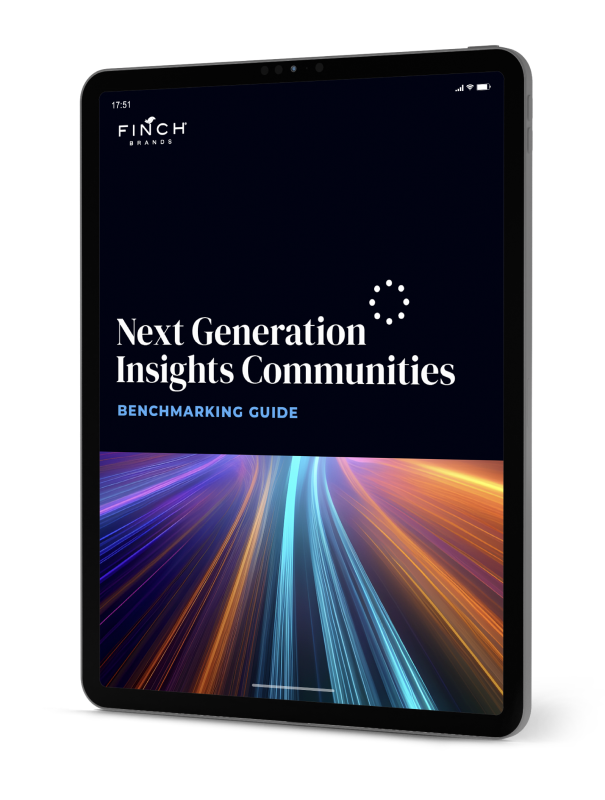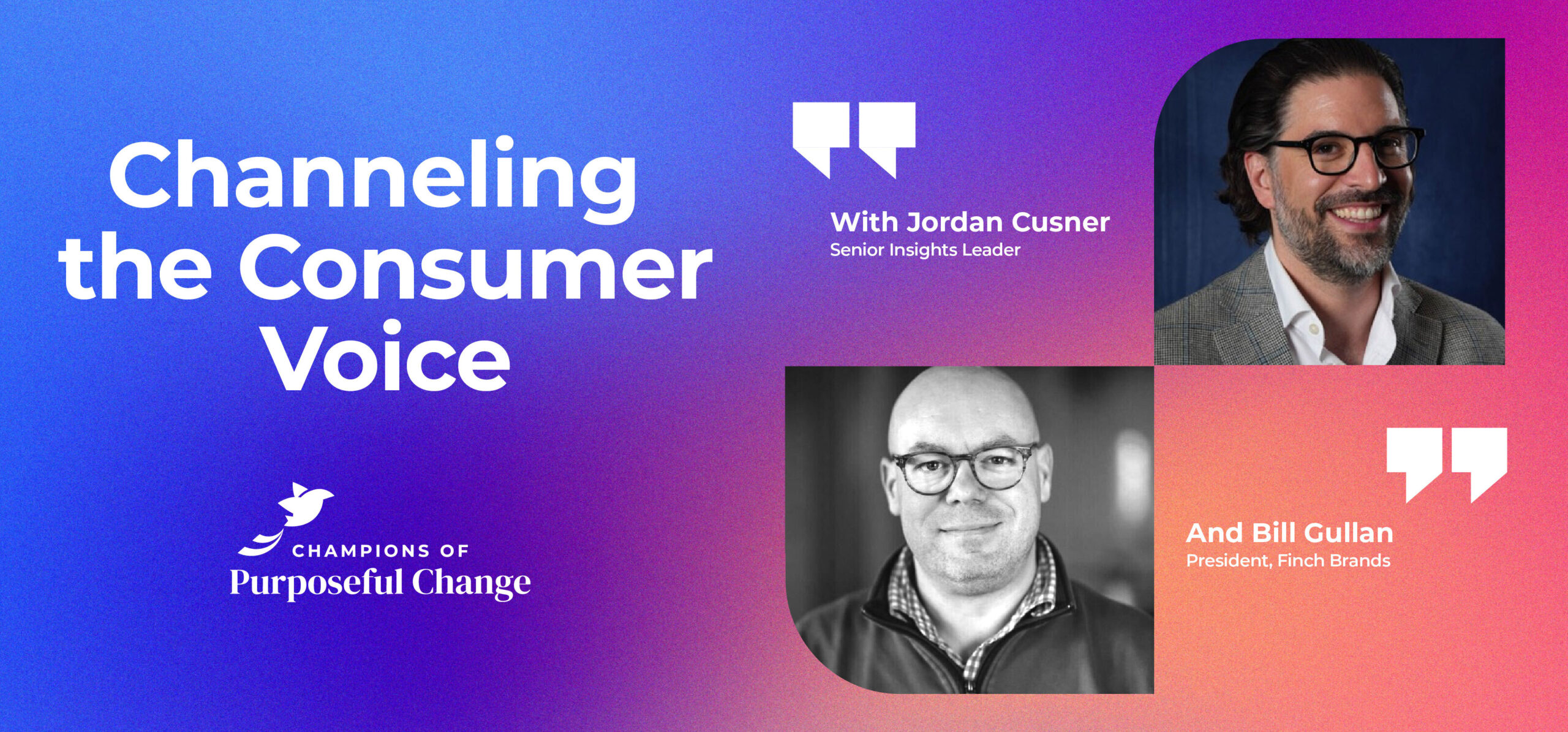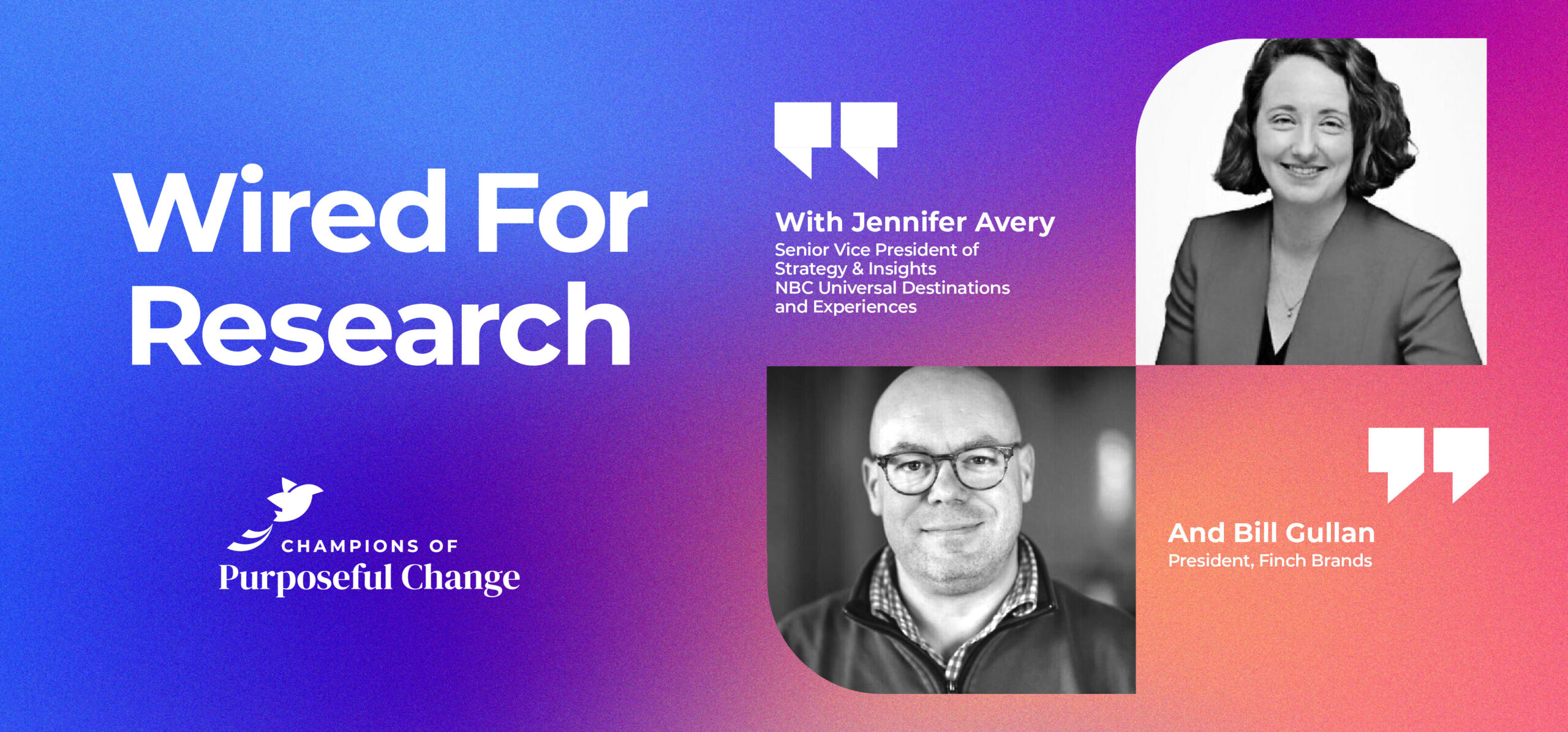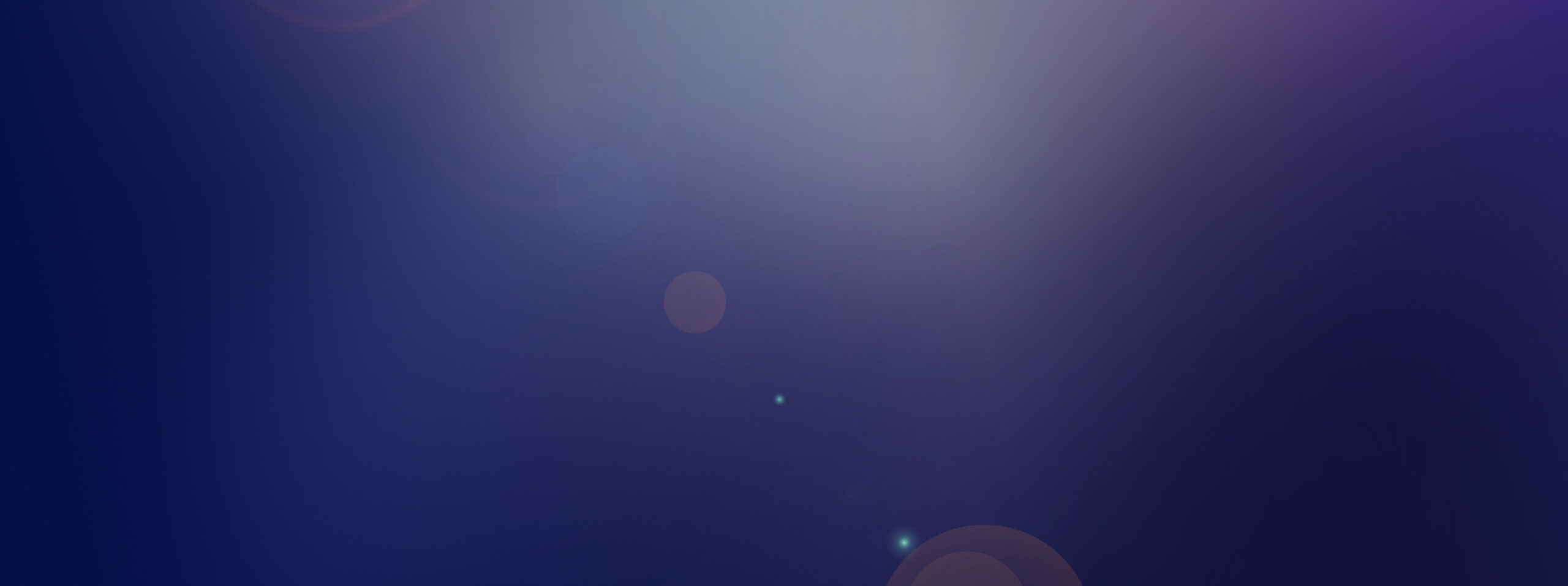Leading with Insights with Leslie Willis of DIRECTV
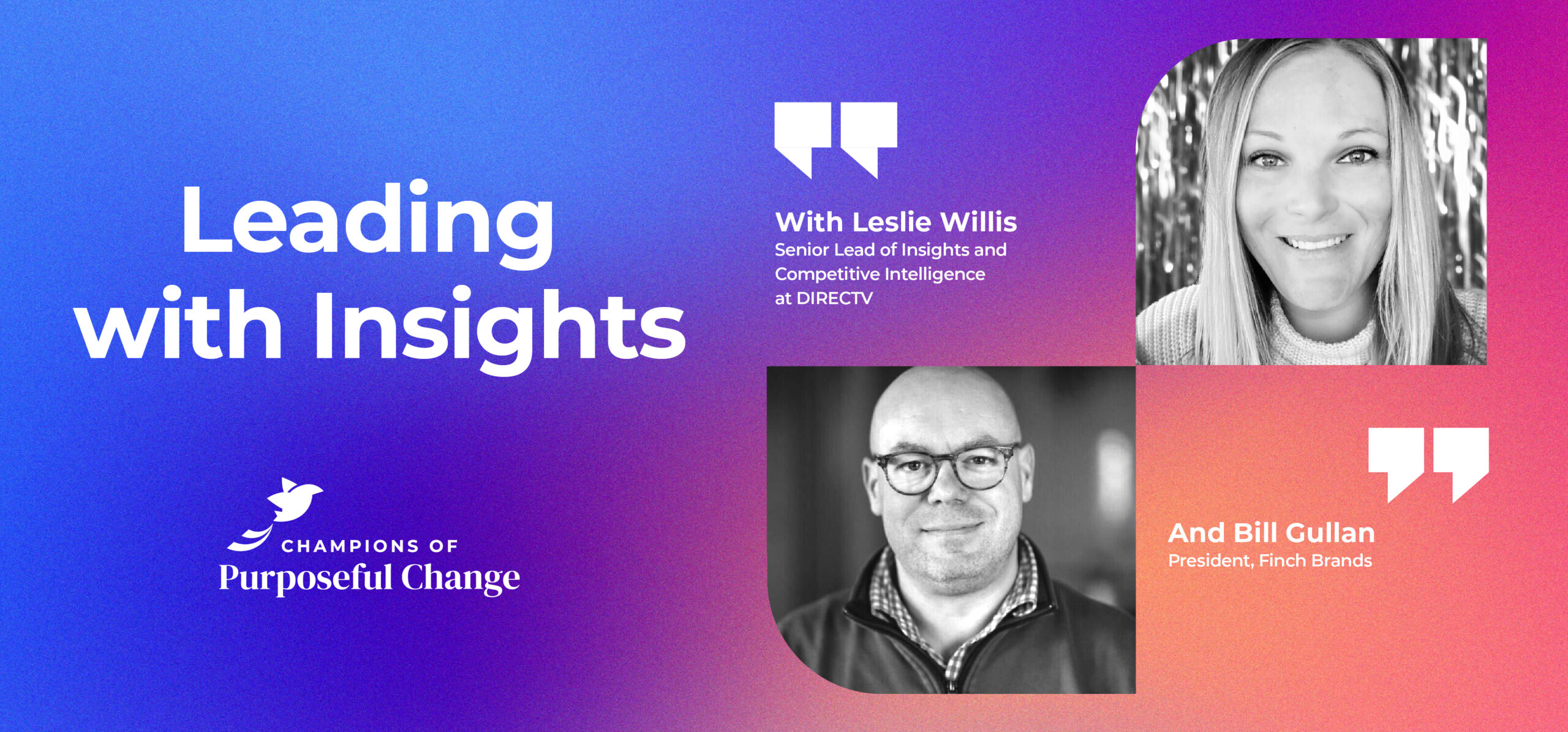
We sit down with Leslie Willis, Senior Lead of Insights and Competitive Intelligence at DIRECTV. Even as the fundamentals stay the same in an industry and a category that is rapidly shifting, Leslie’s experience on the supplier-side and in client-side roles has shaped her path and led her to where she is today. Join us in welcoming Leslie Willis!
CPC-ep-13
Bill Gullan
Greetings, one and all. Thank you for joining us on Champions of Purposeful Change. I’m Bill Gullan, President of Finch Brands, and we are excited to have Leslie Willis today.
Leslie is the Senior Lead of Insights and Competitive Intelligence at DirecTV. Leslie is going to take us through, God, our industry is changing so fast. In some ways, it’s not. It’s the same fundamentals, but in so many other ways, as Leslie will detail, things are shifting. She’s also in a category that has shifted a lot, you know, from satellite to streaming, everything in between, and tremendous supplier-side experience as well as client-side experience, and she’ll take you through all of that, as well as her thoughts on kind of what’s catching her eye these days. So enjoy the input and the time and the insight of Leslie Willis.
We are so excited to have Leslie Willis with us. Leslie is the Senior Lead of Competitive Intelligence at DirecTV, and a ton of interesting experiences along the way that I’m excited to hear about, but Leslie, thank you for your time.
Leslie Willis
Oh my gosh, Bill, thank you so much for having me. I’m really excited to do this.
Bill Gullan
Oh, as are we, and let’s not keep our listeners waiting too long. I’d love to just kind of hear it. Sociology undergrad through supplier-side roles, kind of brand-side roles.
Give us kind of a clip notes version of the journey you’ve taken. It’s fascinating.
Leslie Willis
So it’s been a wild ride, Bill. I won’t lie. You know, I graduated college, and I had this hippie boyfriend that was like, let’s move to Colorado.
And I was like, okay, I’ve never been to Colorado, but sure, there’s mountains, you know, let’s go. And so we moved to Colorado, and we lived in a tent for a couple weeks until I managed to find a job. And it was a job as a receptionist at a focus group facility at InGather Research in Denver.
And so I managed to snag that job as a receptionist. And over time, I think because I had a sociology background, the owner of the facility was like, I think we could put you to work in some other ways besides just like your organizational skills. I think you have an aptitude for research.
And so she kind of took me under her wing, Christine Cook, who used to run InGather Research. And she really kind of taught me the ropes. And she got me hooked up with Insights Association.
And so I started meeting people through Insights Association and being on the board. And so that’s how I kind of got started. I had someone mentor me, honestly.
And then from there, it just kind of grew. From InGather, I went to, it’s now called, oh gosh, it used to be called Metro State College of Denver. I can’t remember, it’s called something else now.
But I went and worked in their institutional research department. From there, I went to authentic response on the sample side. And, you know, kind of like, I don’t know, cut my teeth that way a little bit, if you will.
And, oh my gosh, not even sure exactly where I went after that. But at some point after that, I ended up in my first corporate role at Sports Authority. And so they took a chance on a baby researcher who had never really done the job before.
I was one of the first researchers that Sports Authority ever hired. And that was in 2011. So they were a little behind the eight ball on that.
But let me tell you, I got some of the most incredible experience working there. Absolutely insane. And I still keep in touch, I still keep in touch with some of the executives today, which has been great.
From Sports Authority, I ended up at Medallia doing solutions consulting. So kind of helping other brands, you know, implement NPS programs or things like that. And then was at our local NBC affiliate for a while, spent time at T-Mobile, and now I’m at DirecTV.
So it’s been a wild ride. I’ve had a lot of jobs, but I’ve been really fortunate. You know, I’ve worked in a lot of industries and it’s been really cool.
Bill Gullan
Yeah, wonderful. A couple of questions on that, and then we’ll go into kind of today forward. But sociology undergrad, I mean, did you, was that kind of, I need to pick one, or did you early on, was there something that kind of lit you up about that?
And has that been a thread for why maybe insights really connected with you? A million percent.
Leslie Willis
I took, you know, you have to take all these electives and I ended up taking sociology 101 or something as an elective and it just, taking it, it just clicked with me. Like I have always been fascinated by people, people just fascinate me. And so kind of marrying like study of people with consumer behavior just made sense to me.
And again, I really, I had a great sociology professor who saw something in me and wanted to nurture me. And through that, you know, she kind of got me into statistics classes and became my thesis advisor. So it was really a mentorship thing, but yeah, sociology is kind of what started it all.
And let me tell you, I don’t think anyone would want to listen to me teach. I don’t know, I don’t know if they have the patience for it. And I think you either go into sociology to like teach or do research.
So research it was, and then everything just kind of fell into place weirdly enough as it tends to do sometimes.
Bill Gullan
As it tends to do. And I mean, to your point, most, one of the threads of the interviews that we’ve conducted as well, you know, people we meet clients and others in the insights world is, you know, very few people kind of know early on that this is it, you know, whether they’re sociology or anthropology or psychology or any anywhere else, but liberal artsy like people am curious. And then over time, it becomes, you know, sort of a central fact of either a career that’s growing or just something that people fall in love with.
And it sounds like that that happened for you. So when you think about what it takes to be in love with insights and effective in an insights role beyond kind of sociology, interest in people, I mean, over time, have you kind of built an inventory of what a great insights person, how they need to think or what they need to have?
Leslie Willis
Well, it insatiable curiosity. That is what I have found through, you know, my own experiences. It’s what I’ve told, you know, direct reports that I’ve mentored.
I think that insatiable curiosity can get you anywhere as a researcher. You can build all the skills you need. You know, you can build your data science skills.
You can build your research, you know, your questionnaire development skills. But one thing I don’t think can be taught is that like drive to really understand the what behind the why or the why behind the what. And I it’s it’s it’s been incredible.
It’s been so fascinating to me as a human to get to like study that kind of stuff every day and get paid for it.
Bill Gullan
No, no doubt. You mentioned your insights association roles sort of. And before we started, we were talking about, you know, trade shows and kind of just people along the way.
Could you talk about kind of the role of the industry in both your education as well as, you know, almost the the community based sort of side of this? Because in some ways, this is a big segment. In other ways, it feels small.
Same people, same firms. What role did that play in your development? And I mean, obviously, there’s a networking side of it, but just the people that you met along the way.
Leslie Willis
Yeah, I mean, some of it is, you know, networking. Absolutely. I’ve made some great friends, one of which who brought me to your podcast.
Bill Gullan
Yeah.
Leslie Willis
You know, and that has been a huge part of it. But the learning and education has also been a great part. And I’m sure we’ll get into this, but I took a little career break a couple of years ago.
But the Insights Association, because I was involved with them, I was able to help them recruit speakers for a conference specifically on AI. And so while I was out of work, while I was just blowing up, you know, I had all these opportunities to learn about AI and its applications in research through the Insights Association. And then also when I was ready to start working again, it’s a great place to start reaching out to your network and, you know, understanding what’s out there.
And those personal connections will never, ever hurt you, especially in an industry like research, where at least for me, I don’t do people, I don’t do business with people that I don’t know.
Bill Gullan
Right.
Leslie Willis
You know, and I’m really fortunate that way. I’ve gotten to that point in my career, I’ve met a lot of people, but it’s really important to me to have personal relationships with the people I do business with. And so that’s really been helpful is to just meet some incredibly bright, awesome, dedicated people through Insights Association.
Bill Gullan
Yeah, definitely. You mentioned some roles in the supplier universe from focus group facilities to sample houses to others, you know, NPS and Medallia. And then obviously the brand side with T-Mobile, now with DirecTV, the Sports Authority, et cetera.
Could you sort of compare and contrast or just, I guess, talk us through the differences and the similarities between supplier side and brand side?
Leslie Willis
Absolutely. You know, I think the supplier side, I really enjoyed kind of learning the building blocks of the industry from the ground up. You know, you learn all the sorts of like interesting little tidbits about research.
You understand how to design survey questionnaires. You understand how sampling works. When you move over to the supplier side, you kind of get to take all those things and apply them into how you can strategically grow your business.
So you’re able to take kind of like the actual numbers of the research and distill that into insights that you can then pass along to your team, you know, in order to make the best decision possible for the business. So it’s been, you know, I love learning all the workings and the underpinnings of research on the supplier side. But the strategic side of, you know, taking those insights and turning them into action is something that I’ve really enjoyed on the client side.
Bill Gullan
Yeah. And related to that, whether as a supplier or as a function within a brand, you talk about turning data into insight with which to help kind of aid decision-making and understanding what’s happening in the world. One of the persistent themes we tend to talk about in here with people is what makes research meaningful within organizations.
Any reflections on, you know, I guess what it takes for executives to really get it, to have the right insight to inform action, for research to have impact within an organization like DirecTV. What does it take?
Leslie Willis
I think it, you know, again, it takes insatiable curiosity. It takes some forward thinking. So you don’t necessarily always want to present executives with things that have happened in the past.
You want to prepare them for things that might happen in the future. And you also, you really want to democratize insights across the entire organization. At DirecTV, we do have an instance of a tool that where we kind of, it’s a research repository, right?
And we upload all of our decks, our spreadsheets, our like everything that we create as a team gets uploaded into this tool, along with like S&P market intelligence information, with Kagan Research, with other syndicated research suppliers that we subscribe to. And it has an AI tool built in, so we can kind of comb through all of these, you know, all these nuggets that we’ve put together across different projects and really, really come up with some interesting themes or some business cases that we could justify. And I think that has been really important in kind of helping us shape strategy at DirecTV is AI has been huge.
You know, obviously I don’t want to beat a dead horse with AI. Everyone’s talking about it, but it’s kind of hard not to. It’s made my job a lot easier.
And it’s made me be able to kind of distill those insights down from like big nebulous things into actually actionable bullet points for leadership.
Bill Gullan
And has that primarily been about combing through the wide range of data that you have access to, to find the things and the threads, any other ways in which AIs, you know, don’t tell me anything that’s proprietary, but in terms of other ways in which it’s made things better?
Leslie Willis
Yeah, I think we’re in a unique situation. We recently separated from the parent company that had owned us for many years. And so we’re now kind of like, we have a different philosophy than the parent company did.
So we’re still kind of spinning out what that looks like. But we do have instances of AI. We have an AI trailblazers team.
One of the I’m personally working on just like as a stretch project is our team are, I’m not sure if you’ve ever heard of Barbara Minto. She was a consultant at McKinsey back in the seventies and in the eighties, she wrote a book called The Pyramid Principle. And it’s about how you structure your arguments in a story for really the most executive impact.
And so one of my projects is, I think, we’ll see if it works, but I’m going to attempt to build a custom GPT that is trained on the Minto principle. And then we can upload our decks and stories into it and help use that pyramid principle to really refine our messaging for executives and tie it back to business goals. So who knows if it’s actually going to work, but it’s in my brain and I want to do it.
And we’ll see, I’ll let you know.
Bill Gullan
Love to hear it. It’s fascinating. Yeah.
You know, the world of DirecTV, and again, don’t share anything that you don’t feel comfortable, but it’s probably my sense from the outside is that it’s interesting because on one hand you have this kind of day in, day out, ground war, competitors, promotions, different things, but it’s an industry that is certainly not static by any sense, you know, any sense with the death of streaming and all new technologies. So like, how do you balance and I guess deliver against the need to sort of compete and win day in, day out, you know, subscriber retention and acquisition versus just seismic changes that are reshaping the way that people consume content?
I’d imagine there’s kind of a ground war and an air war, there’s, you know, today and tomorrow, but how do you think about that as an insights person?
Leslie Willis
Yeah. I mean, for any, for me, anything with a screen or an audio port is competition, right? Like if you, if you look at Nielsen’s gauge data, I mean, YouTube is the highest singular, you know, video source in the US.
It’s not any sort of video provider. It’s not us, you know, it’s not Xfinity, it’s YouTube. And viewing has shifted, social viewing, social video has taken off with TikTok.
People are spending a ton of time on TikTok. Fast, the free stations, your Pluto’s, your Tubi’s, your Roku channels, those are massive competitors as well. However, there will usually always, there is always going to be a subset of people that wants to pay TV.
There are always going to be a subset of people, maybe not always, but for now there’s a lot of rural people living in rural areas who don’t have fast internet, who needs satellite TV. And we want to make sure that we’re providing for them while also innovating for new generations, new groups of people who historically, you know, may not have had pay TV, but can come into one of our new genre pack bundles, for instance, for a lot lower price point. And, and kind of like, I don’t know, maybe reevaluate that relationship with live TV now that, now that it’s at a price point they can afford.
Bill Gullan
Yeah, sure. No, it’s interesting. So it’s, you know, there’s massive changes surrounding it, but there’s a lot of folks, to your point, some consumers are early adopters or they live in areas where they have all these options and others don’t.
Leslie Willis
Trying to, we’re trying to hit every aspect of the spectrum, right? We have MyFreeDirectTV, which is a free resource for people to use, you know, and then we can kind of funnel people into our genre packs, which are, which are smaller packages of content. And then for the people who want everything, we have all that as well.
And so, you know, that’s the role of the competitive intelligence and consumer insights teams at DirectTV, you know, to kind of understand, you know, what’s the addressable market for each of these products? And how do we make them stand out to each of those markets?
Bill Gullan
Right. Some people who are skeptics of primary research, you know, will point to Steve Jobs saying, I would never, you know, ask a consumer what that’s on us to be the visionaries. I mean, you know, there’s a point, which is no consumer would have said that what I want is this, what became the iPod.
I want music in this little thing because, I mean, consumers wouldn’t have the ability to do that. And with the rate of change, with AI, with all the things that are shaping our lives, are there techniques or mindsets that help you use consumer insights in ways or tease out unanticipated needs or help, you know, people don’t know what the future is. And it’s brands and visionaries that create that future option set.
So consumers can’t think about and help with innovation in that way. But how do we find sort of value in their input, I guess, and wade through their perceptions of what they’re aware of? Is that a challenge?
And if so, how do we meet it?
Leslie Willis
I mean, it’s historically been a big challenge, right? Like you have to kind of manually comb through these data sets and read all these, reports from futurists and try to manually kind of like put all the pieces together. But again, going back to AI, our favorite tool, you know, AI can really help with that.
And if you can give it prompts and tell it what you’re looking for and feed it a lot of data, it is able to, with a lot of refinement, it’s able to spit out some pretty good ideas that maybe, you know, or your company hadn’t thought of before. But without going like into too much detail, you know, I think it’s a really interesting use case for AI.
Bill Gullan
Yeah, no doubt. And so we talked about AI a couple of ways. I mean, one of the things we found, Leslie, is that while there is a tremendous appetite and capability in whether it’s AI or other sort of technical elements that really create a force multiplier for data analysis and consumption on sort of that end of the side, on the market, we’ve also found among our clients a, throwing back to sociology, in your case, political science in mind, a real rebirth in the desire for sort of immersive human experiences too within research. And so I’m curious how you see the role of, and whether we call these traditional or not, whether it’s, you know, methodographies or the really sort of intimate, immersive styles of research that maybe in some ways we’re falling by the wayside with big data.
I don’t know. We’ve heard from some, at least, that that’s back and human connection needs to be part of it. So how do you think about that and the balance between high-tech, you know, increases in force and capability, but on the other hand, the enduring human truth that drives a lot of this?
Leslie Willis
I think one of the really interesting things that our consumer insights team recently did that I was not a part of, but I heard about it and I thought it was fascinating is, and it’s something I’ve done in the past, is we are bringing executives back into the rooms with consumers. So, you know, we will do focus groups where we will recruit consumers and not have the executives in the back room watching the focus groups, but having the executives actually at the table with our customers. And because I think, because of big data and because of these, you know, massive quantitative studies that we’re running, sometimes the actual voice, the physical voice of the consumer gets lost.
And so I think you have to bring humanity back into the equation at different points throughout the journey, because yes, we’re giving them consumer insights, but they’re not hearing it directly from the consumer’s mouths. And that is incredibly powerful, whether you’re doing it in person or through video interviews or something like that. It’s something we find really, really important because people are passionate about TV.
In our case, you know, they’re passionate about the content they watch and they want to give us their opinions. So making sure we listen to them at that more granular level is really, really important too.
Bill Gullan
Right. And it sounds like the style of listening, having executives experience it in flesh and blood and live, without a screen, without a deck, helps their ability to get it and feel it.
Leslie Willis
Yeah. Yeah. And then we’re all, you know, it just helps us understand we’re all working towards the same goal from, you know, the top of the company down to the people on my team.
You know, we’re all working towards the same things and we’ve all heard the same things from consumers.
Bill Gullan
Yeah. Makes sense. Makes sense.
And I can see how in organizations that are large and running in a bunch of different directions that sometimes reorienting folks at HQ to the nature of the customer through an interaction could have a impactful sort of mindset, you know, shift or whatever. Makes sense. We’ve talked about AI and obviously the whole world is.
What are some other things that you’re seeing out there or that you’re interested in? You talked about AI and sort of combining that with a tried and true method of kind of storytelling. So, you know, where the past meets the future.
Other things that are kind of, as you go to events or interact with colleagues that you’re, that you’re kind of looking at these days that are emerging or that are trending in the space.
Leslie Willis
Yeah. I think, I mean, AI is obviously, I think it is, it’s really is the number one. It’s the hot topic of conversation and kind of for me, a lot of other stuff has fallen by the wayside, which is probably pretty bad.
I should get back out there, but I think I’m so enthralled and enamored with AI and the capabilities that it has, especially, you know, in my own role. I mean, when I was a junior researcher, if I had AI to help me code verbatim files, like, you know, these, these are the things I think that really help researchers focus on the actual task at hand and not like the admin stuff. But another thing that’s happening in the industry and I’ve recently run across it myself and I won’t put people on blast here, but we had a vendor run a survey for us and I got the survey back and it just did not, you know, it just didn’t look right.
It really didn’t look right, didn’t match up with anything. So we had them look into it. Turns out the survey was just infiltrated with bots.
And it was the, yeah, it’s the first time I really, you know, I don’t do a ton of quantitative in my role. You know, I’m sure people have run up against this. I know sample quality has been an issue in the industry forever.
But with AI, like I’m seeing it become even worse. I’m seeing so many AI answers in my open ends. You know, so, and with, with AI data now and people using AI data itself and synthetic data to solve problems, like I just, I don’t know enough about it to have a really informed opinion on it right now, but I know it’s something that I’m definitely concerned with.
And I’m glad to see the industry kind of overall tackling it because it’s a, it’s a big problem. You know, we’re making huge business decisions based off of this data. And so to hear that one of our surveys was completely infiltrated was an eye opener.
Bill Gullan
Yeah, totally. And new, new technologies create ever more, you know, it’s kind of whack-a-mole, right? I mean, for a while it was, there’s certain types of consumers that were having trouble reaching and then now it’s, yeah, sample quality and it used to be, you know, straightening.
It used to be fatigue. It used to be stuff and it’s always something new. So yeah, agreed into your point.
Leslie Willis
Now it’s, it’s a human.
Bill Gullan
Is it a human? Right, right. Absolutely.
Last question. I mean, we’ll see where it takes us, but last question. This has been awesome, Leslie.
Thank you. When, when you reflect back on, on, on that sort of road that you’ve taken from sociology to, to the tent, to the receptionist role that kind of brought you into the insights realm, at least in a tentative way. And that became a career for somebody who may be interested in, in insights.
Hopefully this podcast has a role in helping awaken some folks who may be starting out or starting over to consider insights paths. Any, any words of wisdom from the time you’ve spent in your development path that that somebody early in their career, you know, that you’d want to share with that person?
Leslie Willis
Absolutely. You know, again, I think the number one thing is be curious, being curious, like actually really curious in your own heart about the consumer data and the consumers that you’re trying to understand that will take you a long way, just like enthusiasm and curiosity. The second thing, and we also talked about this is find a community.
The Insights Association has so many people, and a lot of us have been, have been going to, you know, these conferences and things for years. And I personally, I love introducing new people to people that I’ve worked with before. I love making those connections.
And I think a lot of us in research feel the same way. And, you know, if you’re young and just starting out, take the leap, go to, go to like a happy hour. The Insights Association is just one of the associations you can join, right?
But there’s so many, and a lot of them are local and active in, in specific cities. And if you can find something going on, go join, go meet some people. It’s only going to help you talk, bounce around ideas, you know.
I think your community and your network cannot be like, the importance of it cannot be overstated. You know, especially as you nurture those relationships through time, they will bring you more like opportunities and more fun times than you would ever get just kind of floating by yourself.
Bill Gullan
Now it makes sense. And I also have found that the insights industry writ large is a welcoming group of people and a very friendly place. Yeah.
Leslie Willis
I mean, I wouldn’t have had the opportunities that I had, had it not been for very specific mentors who really said like, I want to take this person and nurture her and, and help her grow. And people, people did that for me without question. And they’ve continued to do that for me throughout my career.
Whenever I have a really hard question, you know, whether it’s a massive segmentation question or an ethnography question, I have now this network of people I can reach out to, to help me understand that. I don’t have to be all knowledgeable. I just have to build, you know, a network of people around me that can help me answer all those questions.
So again, it just really can’t be overstated.
Bill Gullan
Definitely. Awesome. Well, thank you.
And we’ll leave it, we’ll leave it there because I know you have an actual job to do, not just hanging out with me, although that Leslie, but Leslie, thank you so much for…
Leslie Willis
You’re saving me from reading 10K reports, Bill.
Bill Gullan
I don’t know. That’s not saving. I’m depriving you of the joy of, of 10K reports and all the, all the wisdom that exists within the Wall Street paper.
Leslie Willis
Oh man, so much fun. Hey, that’s another thing that I love AI for. Thank God for AI and combing 10K.
Bill Gullan
Yes, it’s, it’s, it’s true. And you know, when you’re, when your competitors and your company are in the public markets, a lot of paper and a lot, a lot going on, no doubt. Exactly.
Well, thank you so much for spending a bit of time with us. It was, it was a pleasure and I’m sure our audience greatly appreciates your insight and all that you’ve accomplished and the perspective that you have all along the way.
Leslie Willis
Thanks, Bill. It’s been, it’s been a real pleasure to do this with you and with Finch Brands and I’m excited you asked me. So thanks again.
Bill Gullan
Our thanks to Leslie for a lot to think about and some fun stories and background from her journey. And it’s so interesting how people come to an insights career. As I, as I mentioned in the interview you know, not kids are dreaming of being an astronaut or a baseball player or whatever.
But insights often finds people who by virtue of how they’re wired or what they’ve studied or whatever, who are great at it. I’m sure it finds people who leave too, but it is amazing. The common denominator of curiosity and an interest in people and how that propels folks along amazing careers like Leslie’s.
As always, three ways to help us here at Champions of Purposeful Change. And we haven’t held our promise to do this monthly, but you know, we’ve got a lot going on. This is nobody’s full-time job.
And so we’re trying to keep our frequency up. And if you enjoy this content, help us out. One way to do that is to click subscribe in the podcast app or source of your choice that makes sure that when we post a new episode, you don’t miss it.
It’ll fly right down into your feed. That’s one way. Rate and review is another way to not only give us the feedback that keeps us going, but also to help make sure that we’re, we’re found when people are searching for new content that they might find value in.
If you go to the podcast app or store of your choice, give us a rating, five stars, if we deserved it, as well as a review for what you thought and how we can do better. We’d love that. It helps us.
And then lastly, let’s keep the dialogue going at Bill Gullan at Finch Brands on X or Facebook or email, however you want to do it. We greatly appreciate feedback and ideas for guests and topics. And it’s just nice to know there’s somebody out there since we put so much love into this every time we do it.
So thanks to Leslie and I will sign off from the Cradle of Liberty.

